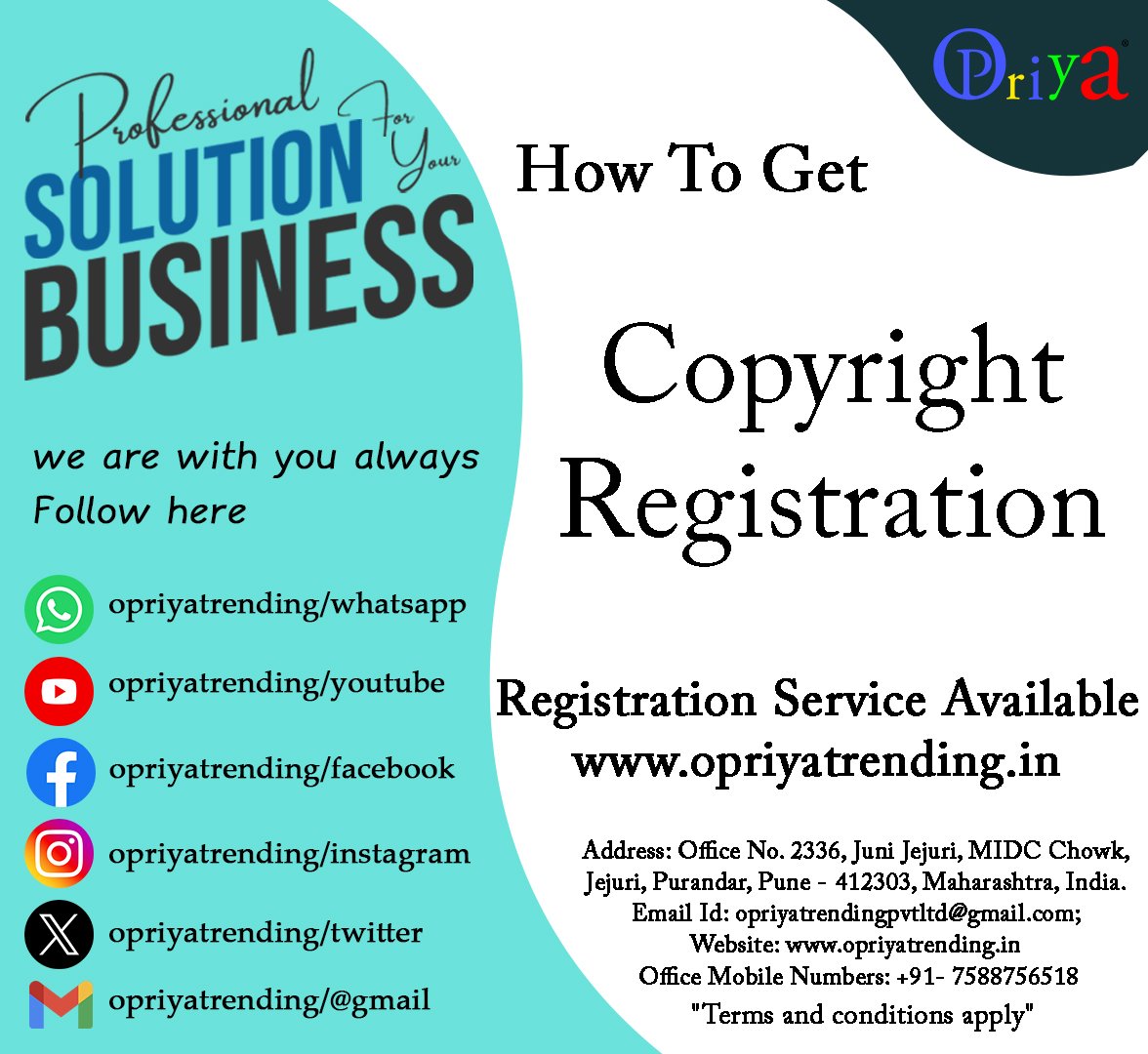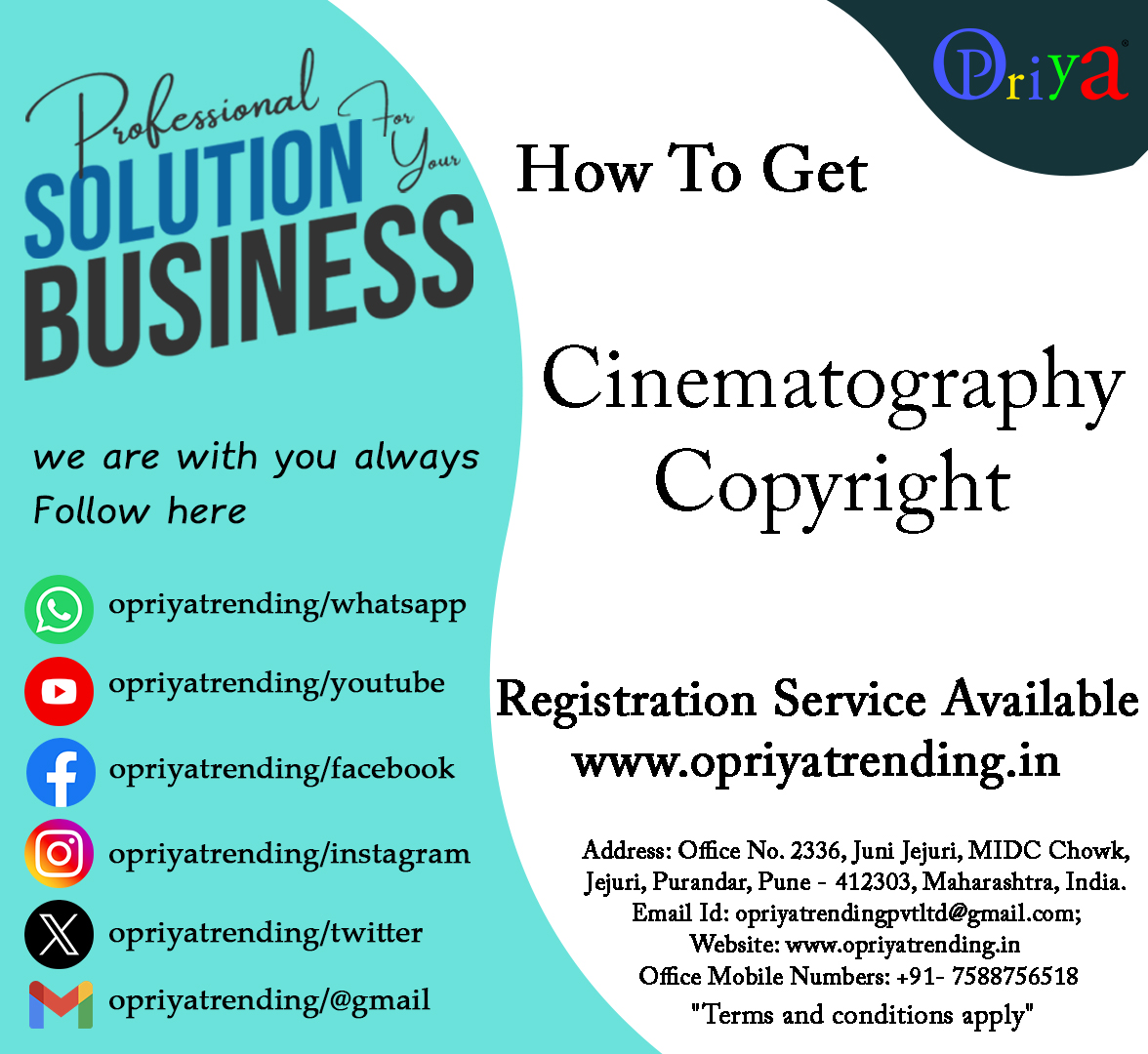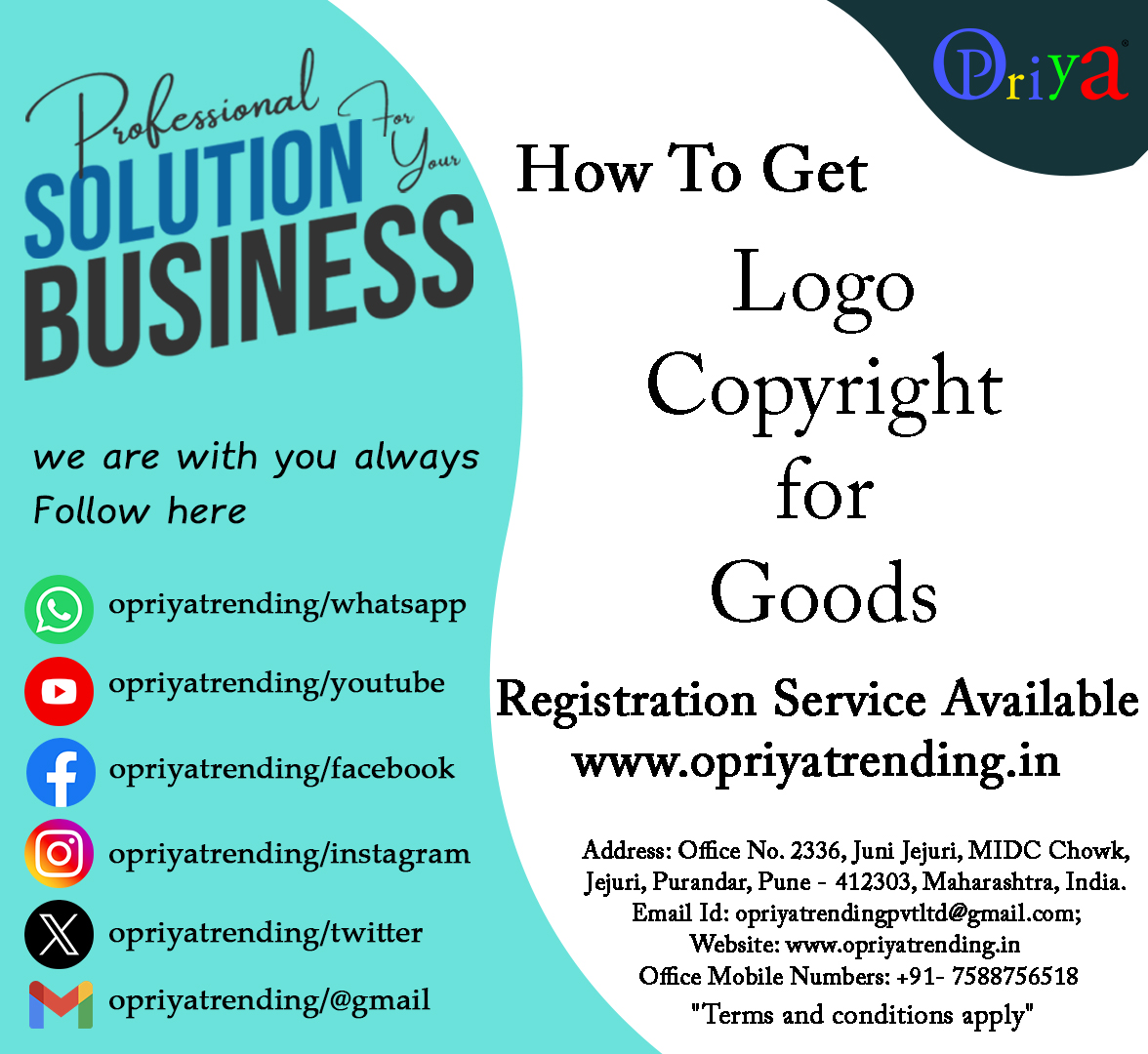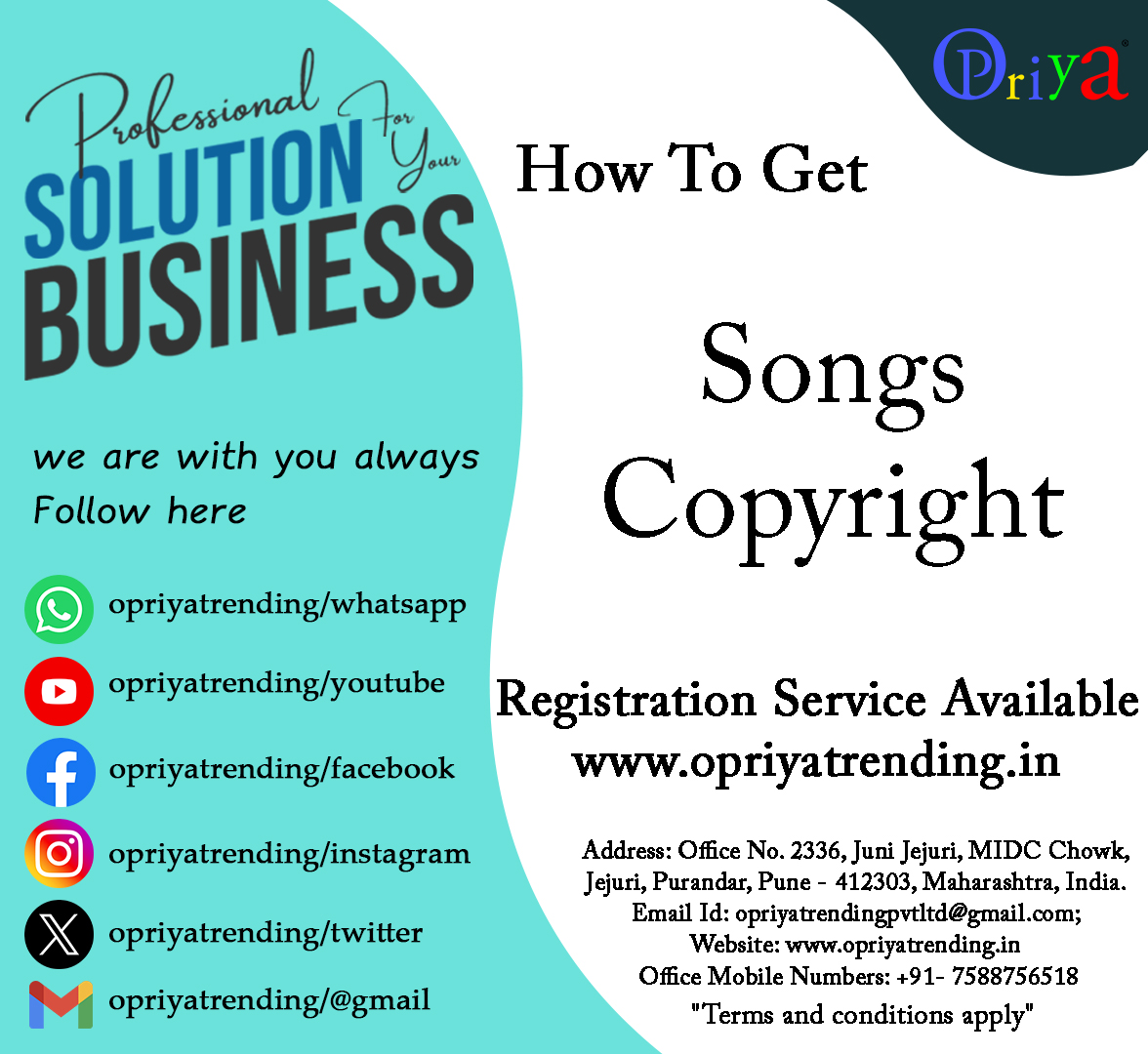✅ Computer Software Copyright
Table of Contents
Computer Software Copyright: Secure Your Software with Legal Protection in 2025
Computer Software Copyright is a critical legal tool that helps software developers, IT companies, and creators protect their digital innovations. Whether you’ve designed a web application, created source code, or built a desktop program, Computer Software Copyright ensures your intellectual property is legally protected in India.
In today’s technology-driven era, cyber theft and digital plagiarism are at an all-time high. That’s why applying for Computer Software Copyright with a reliable partner like O’Priya Trading Pvt Ltd can save you from financial losses, legal battles, and reputation damage.
In this comprehensive guide, we’ll cover everything you need to know about Computer Software Copyright in India in 2025.
Types of Computer Software Copyright Licenses Offered
There are multiple types of Computer Software Copyright protections depending on the nature of the software and usage:
1. Exclusive Copyright
This is where the software creator has complete and exclusive rights to distribute, modify, or license the software. Others cannot legally use or copy the software.
2. Non-exclusive License
The creator allows multiple users or organizations to use the software while still holding the copyright. It’s often used in commercial software distribution.
3. Open-source License
Software is made publicly available with certain restrictions. This still needs Computer Software Copyright to establish authorship and rights.
4. Custom Software Licensing
Used when software is developed for a specific company or user. The rights can be transferred or retained based on contractual terms.
Each of these license types falls under the umbrella of Computer Software Copyright, ensuring that the rightful owner is legally protected.
Who Needs These Computer Software Copyright Services?
You should consider applying for Computer Software Copyright if you fall into any of these categories:
- Individual Software Developers – Freelancers or coders who build custom apps or scripts.
- Software Companies – Firms launching ERP systems, CRMs, mobile apps, or SaaS products.
- Startups – Early-stage tech ventures with proprietary software tools or platforms.
- Educational Institutions – Universities or colleges creating digital learning platforms or management tools.
- Government Bodies & NGOs – Developing internal software solutions.
If you’ve created something digital, unique, and valuable, Computer Software Copyright is essential for you.
Why Choose O’Priya Trading Pvt Ltd for Your Copyright Registration?
O’Priya Trading Pvt Ltd is one of India’s most reliable service providers for Computer Software Copyright registration in 2025. Here’s why you should partner with us:
✅ Expertise & Experience
We specialize in handling Computer Software Copyright applications, ensuring no legal detail is overlooked.
✅ Complete Documentation Support
Our team assists in document collection, preparation, and formatting.
✅ Transparent Pricing
With no hidden fees, our pricing is clear and affordable.
✅ Dedicated Case Manager
Every client gets a dedicated point of contact to ensure faster, smoother communication.
✅ Faster Turnaround
We process your Computer Software Copyright applications quickly, with tracking and updates at every stage.
Trust us to handle your Computer Software Copyright needs professionally.
Registration Process for Computer Software Copyright
Here’s how we streamline the Computer Software Copyright process in India:
Step 1: Consultation
We understand your software and advise you on the right type of Computer Software Copyright.
Step 2: Document Collection
Collect and verify documents such as author ID, source code, and software description.
Step 3: Form Filling
We fill out the application Form XIV of the Copyright Act and prepare necessary annexures.
Step 4: Fee Payment
Make the statutory government fee and our service charges.
Step 5: Application Submission
We submit your Computer Software Copyright application online at copyright.gov.in.
Step 6: Diary Number Issued
A unique diary number is generated for future reference and tracking.
Step 7: Objection Review (If any)
In case any objection arises, we handle the legal response and rebuttal.
Step 8: Registration Certificate
Once approved, a Copyright Certificate is issued by the Copyright Office.
We simplify every step of the Computer Software Copyright process.
Required Documents for Computer Software Copyright Registration
Here are the documents required:
- NOC from Developer/Author – A no-objection certificate if the applicant is not the developer.
- Source Code Printout – 10–15 pages of your software’s source code.
- Software Description – A technical overview of what the software does.
- ID Proof – PAN card, Aadhaar, or Passport.
- Address Proof – Electricity bill, Rent Agreement, etc.
- Power of Attorney (POA) – If an agent is filing on your behalf.
- Declaration Form – Stating originality and ownership.
All documents are crucial to successfully apply for Computer Software Copyright.
Cost Involved in Computer Software Copyright Registration
We offer affordable professional services with full transparency:
| Service | Fee (INR) |
|---|---|
| Government Copyright Fee | ₹2,000 |
| O’Priya Trading Pvt Ltd Professional Fee | ₹4,999 |
| GST (if applicable) | As per government |
| Total | ₹6,999 (approx.) |
Note: Bulk registrations may qualify for discounts. Contact us for a custom quote.
Payment Refund Policy (Payment Not Refundable)
We operate with a 30-day money-back guarantee policy — however, please note:
- Government Fees Are Non-refundable
- Refunds apply only if we fail to initiate your application
- Refunds are not provided for client-side delays or errors
Our Computer Software Copyright registration policy ensures clarity and fairness.
Terms and Policy
When applying for Computer Software Copyright with O’Priya Trading Pvt Ltd, you agree to:
- Provide accurate and original content
- Ensure no violation of third-party rights
- Accept that approval lies with the Copyright Office
- Maintain confidentiality of source code shared with us
We take your privacy and legal protection seriously.
Time Taken for Computer Software Copyright Registration
⏱️ Here’s a typical timeline:
| Stage | Timeframe |
|---|---|
| Document Verification | 1–2 working days |
| Application Filing | 1 working day |
| Diary Number Generation | Instant after filing |
| Objection Handling (If any) | 30 days |
| Certificate Issuance | 4–6 months (approx.) |
Your Computer Software Copyright journey begins the moment you contact us.
Common Mistakes to Avoid in Computer Software Copyright Applications
Avoid these critical errors that can delay or reject your application:
- ❌ Submitting incomplete source code
- ❌ Ignoring objections or notices
- ❌ Using plagiarized content
- ❌ Incorrect NOC documentation
- ❌ Filing under the wrong category
These can be frustrating and expensive mistakes, but with us by your side, they’re easy to avoid. Choose Computer Software Copyright expertise—choose confidence.
📞 Call-to-Action – Register Now!
Start protecting your software today.
📧 Email: opriyatrendingpvtltd@gmail.com
📱 WhatsApp: +91 7588756518
🌐 Website: www.opriyatrending.in
📘 Facebook: O’Priya Trading Pvt Ltd
🛡️ Apply with Full Confidence 2025 – We’ve got your back!
FAQs – Computer Software Copyright in India
❓ What is Computer Software Copyright?
Computer Software Copyright is the legal protection given to software creators under the Copyright Act, 1957 in India.
❓ Who owns the copyright – the developer or the company?
It depends. If the software is created by an employee, the employer usually holds rights. Otherwise, the developer retains them.
❓ Is registration mandatory?
No, but registration provides legal proof of ownership, making it easier to fight copyright infringement.
❓ Can I register a mobile app?
Yes, the source code and design of a mobile application can be protected under Computer Software Copyright.
❓ Is it valid internationally?
While Indian registration is local, it strengthens your case under international conventions like the Berne Convention.
❓ How long is the copyright valid?
It lasts 60 years from the year following the author’s death.
❓ Can I modify the software after registration?
Yes, but if substantial changes are made, you can register the new version separately.
❓ What if someone copies my code after registration?
You can send a legal notice, file an FIR, or initiate a civil or criminal case using your Computer Software Copyright Certificate.
O’Priya Trading Private Limited: All India License Registration Service Provider
In today’s complex regulatory landscape, obtaining licenses and regulatory approvals in India has become more essential than ever for businesses, institutions, and individuals. Whether it’s an arms license, FSSAI registration, company incorporation, or compliance with the latest government norms, having the right license determines your legitimacy, credibility, and operational capacity.
One company leading this transformation by providing seamless, reliable, and legally compliant license registration services across India is O’Priya Trading Private Limited. With a strong commitment to transparency, process efficiency, and client satisfaction, O’Priya Trading Pvt. Ltd. has emerged as a trusted name in the Indian licensing domain.
🔷 Company Overview
Legal Name: O’Priya Trading Private Limited
Nature of Business: License Registration, Compliance Advisory, Government Liaison Services
Operational Scale: Pan-India
Head Office: Registered in India, with service availability across all states and union territories
📞 Call-to-Action (CTA) – Apply Now with Confidence!
Ready to secure your Licence Apply with Full Confidence in All Indiaa?
📧 Email: opriyatrendingpvtltd@gmail.com
📱 WhatsApp: +91 7588756518
🌐 Website: www.opriyatrending.in
📘 Facebook: O’Priya Trading Pvt Ltd
Apply with Full Confidence in 2025.
🏛️ What Does O’Priya Trading Pvt Ltd Do?
O’Priya Trading Private Limited specializes in license registration services across India, offering a full range of end-to-end solutions to institutions, businesses, and individuals seeking regulatory permissions and licenses. From document preparation to submission, legal verification, and post-approval compliance, they serve as a single-window license consultancy provider.
🗺️ Pan-India Service Coverage
What makes O’Priya Trading unique is its all-India licensing facilitation network. Unlike regional agencies that operate within narrow jurisdictions, O’Priya has built an operational capacity to deliver services in every Indian state and union territory.
🌍 States Served Include:
- Delhi, Maharashtra, Uttar Pradesh, Gujarat, Rajasthan, Madhya Pradesh, Karnataka, Tamil Nadu, Kerala, Telangana, Punjab, Haryana, Assam, West Bengal, Bihar, Jharkhand, Odisha, Chhattisgarh, and more.
🏢 Cities with Active Clients:
- Mumbai, Pune, Delhi, Hyderabad, Bangalore, Kolkata, Ahmedabad, Chennai, Jaipur, Lucknow, Bhopal, Indore, Surat, Patna, and others.
Through a digital-first approach, coupled with experienced local legal liaisons, O’Priya ensures consistency in documentation, faster government approvals, and responsive client support.
💡 Why Clients Trust O’Priya Trading Pvt Ltd
1. ✅ Transparency & Ethics
🔒 100% Transparent | No Hidden Fees | Pan-India Services We believe in:
- Clear timelines
- Upfront pricing
- Honesty about payment policies (non-refundable, refundable, no surprises)
- Total confidentiality
2. 🧾 Documentation Expertise
Most license applications are delayed due to incomplete, incorrect, or improperly formatted documents. O’Priya’s legal consultants help you prepare foolproof documentation as per the latest formats demanded by regulatory bodies.
3. 🧑⚖️ Government Liaison
Whether it’s a district magistrate’s office, arms licensing authority, food safety department, or ROC office, O’Priya has built solid working relationships with relevant departments across states.
4. 🚀 Quick Turnaround
With strong process knowledge and digital tools, O’Priya delivers faster application submissions, consistent follow-ups, and streamlined approvals—ensuring minimal disruption to your business.
5. 💬 Client-Centric Support
They offer multi-channel communication: WhatsApp, email, video calls, and in some cases, in-person assistance. Clients are never left guessing about the status of their application.
📂 Service Flow: How It Works
Step 1: Free Consultation
Client reaches out via WhatsApp or email. A dedicated case manager responds with guidance and documentation checklist.
Step 2: Document Compilation
The team helps the client gather and format all required documents—identities, justifications, organizational registrations, etc.
Step 3: Application Filing
Forms are filled and submitted either physically or digitally, depending on the department’s workflow.
Step 4: Verification Support
Whether it’s a police inquiry or local office inspection, the team ensures you’re prepared and compliant.
Step 5: Approval & Delivery
Once approved, the license or certificate is collected and shared with the client via secure channels. Renewals and annual compliances are also managed, if opted for.
🔍 Industries Served
| Industry | Licenses Provided |
| Security | PSARA, Arms License |
| Food & Beverages | FSSAI, Shop Act, GST |
| Manufacturing | Factory License, Pollution NOC |
| Healthcare | Drug License, Biomedical Waste License |
| Retail & E-commerce | GST, MSME, Trademark |
| Education/Training | Arms License (Training), ISO, Accreditation support |
This industry-specific approach helps clients get exactly what they need—no more, no less.
📊 Success Metrics (As of 2025)
- ✅ 4,000+ Licenses Approved
- ✅ 95% Success Rate on First Submissions
- ✅ 100+ Cities Served
- ✅ 40+ License Categories Covered
- ✅ 500+ Institutional Arms Licenses Facilitated
🔄 Annual Compliance Services
Beyond just registration, O’Priya also offers post-licensing support, such as:
- Annual license renewals
- Change of address or ownership updates
- Firearms inspection audit preparation
- Document maintenance and digital filing
- Regulatory upgrades (as per rule changes)
This holistic approach ensures clients remain compliant even after license issuance.
📌 Why Choose O’Priya Over Others?
| Feature | O’Priya Trading Pvt Ltd | Typical Local Agent |
| Service Reach | Pan-India | Limited to district/state |
| Process Transparency | High (With Updates) | Often vague or hidden |
| Legal Expertise | Qualified Advisors | Informal guidance |
| Communication | Email, WhatsApp, Call | Mostly phone |
| Refund/Policy Clarity | Documented Terms | Unclear or non-existent |
| Renewal Reminders | Included | Rarely provided |
For businesses and institutions who cannot afford non-compliance or delays, O’Priya offers institutional-grade service quality at competitive prices.
🧭 Vision and Future Outlook
O’Priya Trading Pvt Ltd envisions becoming India’s most trusted regulatory compliance partner. With ongoing investments in:
- AI-based document automation
- Online dashboards for tracking license status
- Partnerships with regional lawyers and consultants
- Digital KYC and identity verification tools
…they aim to make India’s license ecosystem simpler, faster, and corruption-free.
Call-to-Action (CTA) – Apply Now with Confidence!
Ready to secure your Licence Apply with Full Confidence in All Indiaa?
📧 Email: opriyatrendingpvtltd@gmail.com
📱 WhatsApp: +91 7588756518
🌐 Website: www.opriyatrending.in
📘 Facebook: O’Priya Trading Pvt Ltd
Apply with Full Confidence in 2025.
🛡️ Legal. Reliable. Fast. That’s the O’Priya Promise.
📋 List of Services (with Reconstructed Links)
Below is the categorized list of services as per the website’s usage index. Where possible, we’ve added direct or pattern-based links.
1. Arms License Services
- Arms for Individual License Registration
- Arms for Institution License Registration
- Arms for Sports License Registration
- Arms for Dealers License Registration
- Weapons Manufacturing License Registration
2. AYUSH License
- AYUSH Loan & Others License
- AYUSH Manufacturing License
- AYUSH Distribution License
- AYUSH Clinic License
- AYUSH Retail License
3. BIS/ISI/ISO Certifications
4. Compulsory Registrations
- MSME/Udyam Registration
- Startup India Registration
- FSSAI Registration (Central/State)
- Legal Entity Identifier Code
- Trade License
- Fire License
- Digital Signature
- ICEGATE Registration
- FCRA Registration
- 80G and 12A Registration
5. DOT/Telecom Licenses
- ISP License
- NLD/ILD License
- UL VNO License
- PM-WANI Registration
- SACFA Clearance
- IP-1 Registration
- TEC Certificate
- AGR Return Filing
6. Drug License
7. Electrical License
8. GST & Taxation
9. IPR Services (Trademark, Copyright, Patent)
- Trademark Registration
- Trademark Objection Reply
- Patent Filing (Provisional/Complete)
- Copyright Registration
- Design Registration
10. Liquor License
11. MCA Services
- Private Limited Company Registration
- LLP Registration
- OPC Registration
- Annual MCA Compliance
- Company Closure
12. PESO License
13. PSARA License
14. Pollution Control
15. Regulatory Bodies
- NBFC Registration (RBI)
- FFMC & P2P Lending
- Legal Metrology Packager License
- IRDAI Corporate Agent License
📞 Contact O’Priya Trading Pvt Ltd Today
📧 Email: opriyatrendingpvtltd@gmail.com
📱 WhatsApp: +91 7588756518
🌐 Website: www.opriyatrending.in
📘 Facebook: O’Priya Trading Pvt Ltd
🛡️ Legal. Reliable. Fast. That’s the O’Priya Promise.
💖 Why opriyatrending.in is More Than Just a Service Platform
In a country as vast and complex as India, navigating government registrations can feel overwhelming, stressful, and even hopeless at times. But opriyatrending.in doesn’t just offer “services.” It offers reassurance, clarity, and a sense of control—when you need it most.
🛑 The Fear of Rejection, Delays, and Loss
You might have tried applying for licenses yourself before—endless documents, non-responsive departments, confusing portals. It can leave you feeling:
- ❌ Lost in bureaucracy
- ❌ Afraid your business will never take off
- ❌ Unsure who to trust
O’Priya Trading Pvt. Ltd. understands this fear—and fights it by giving you the guidance you were never offered before.
💪 A Partner in Your Growth Journey
Whether you’re a dreamer starting your first startup, a farmer protecting your land, a doctor opening a clinic, or a dealer building your future—this company walks beside you.
- They help you register your identity
- They protect your investment
- They stand between you and the wall of red tape
When opriyatrending.in helps you get your license, they’re not just checking boxes. They’re helping you move forward with confidence.
🧠 A Calm Voice When Everything Feels Chaotic
In a system full of delays, errors, and vague processes, opriyatrending.in offers:
- 🧾 Clear documentation guidance
- 🕐 Honest timelines
- 📞 A human voice when you call or WhatsApp
When you’re in a crisis—whether it’s a license rejection or urgent compliance—they don’t ignore you. They respond. They care.
🌱 Your Dreams Deserve to Be Legal, Protected, and Empowered
Every license, every registration, every clearance—represents a life goal.
It’s your right to:
- Own a weapon for protection
- Start a small company
- Launch a new StartUp company
- Open a food business legally
- Register a company and pass it on to your children
Opriyatrending.in ensures that no dream is delayed because of red tape.
🔗 It’s Not Just a Website It’s a Lifeline.
📍 When you open opriyatrending.in, you’re not just clicking on a page.
You’re saying:
“I’m ready to take a step toward my dream, but I need help.”
And that’s exactly what O’Priya Trading Pvt. Ltd. is here for.
📞 Contact O’Priya Trading Pvt Ltd Today
📧 Email: opriyatrendingpvtltd@gmail.com
📱 WhatsApp: +91 7588756518
🌐 Website: www.opriyatrending.in
📘 Facebook: O’Priya Trading Pvt Ltd
🛡️ Legal. Reliable. Fast. That’s the O’Priya Promise.












